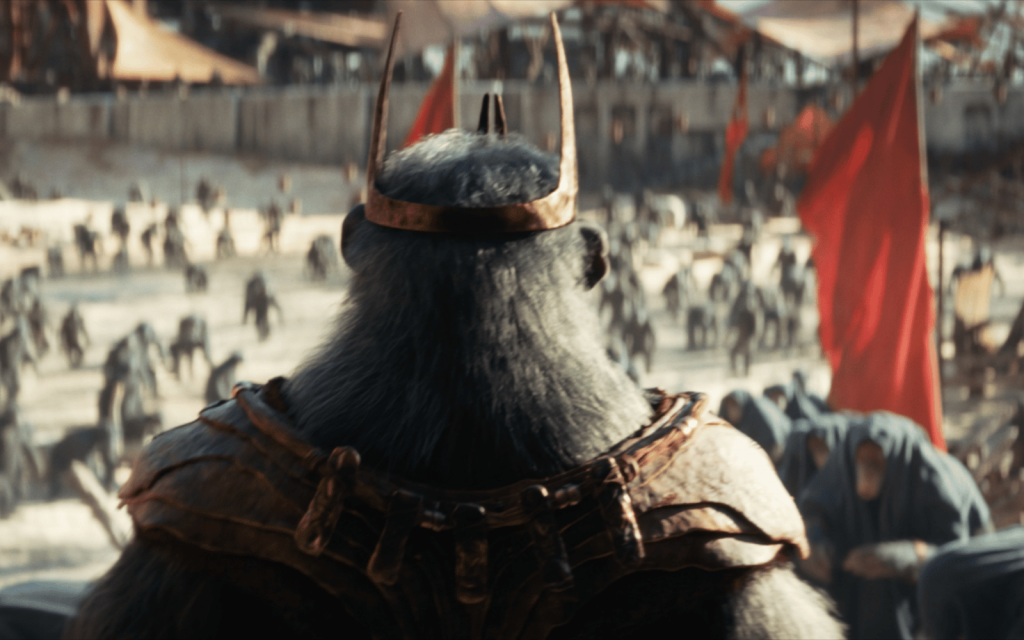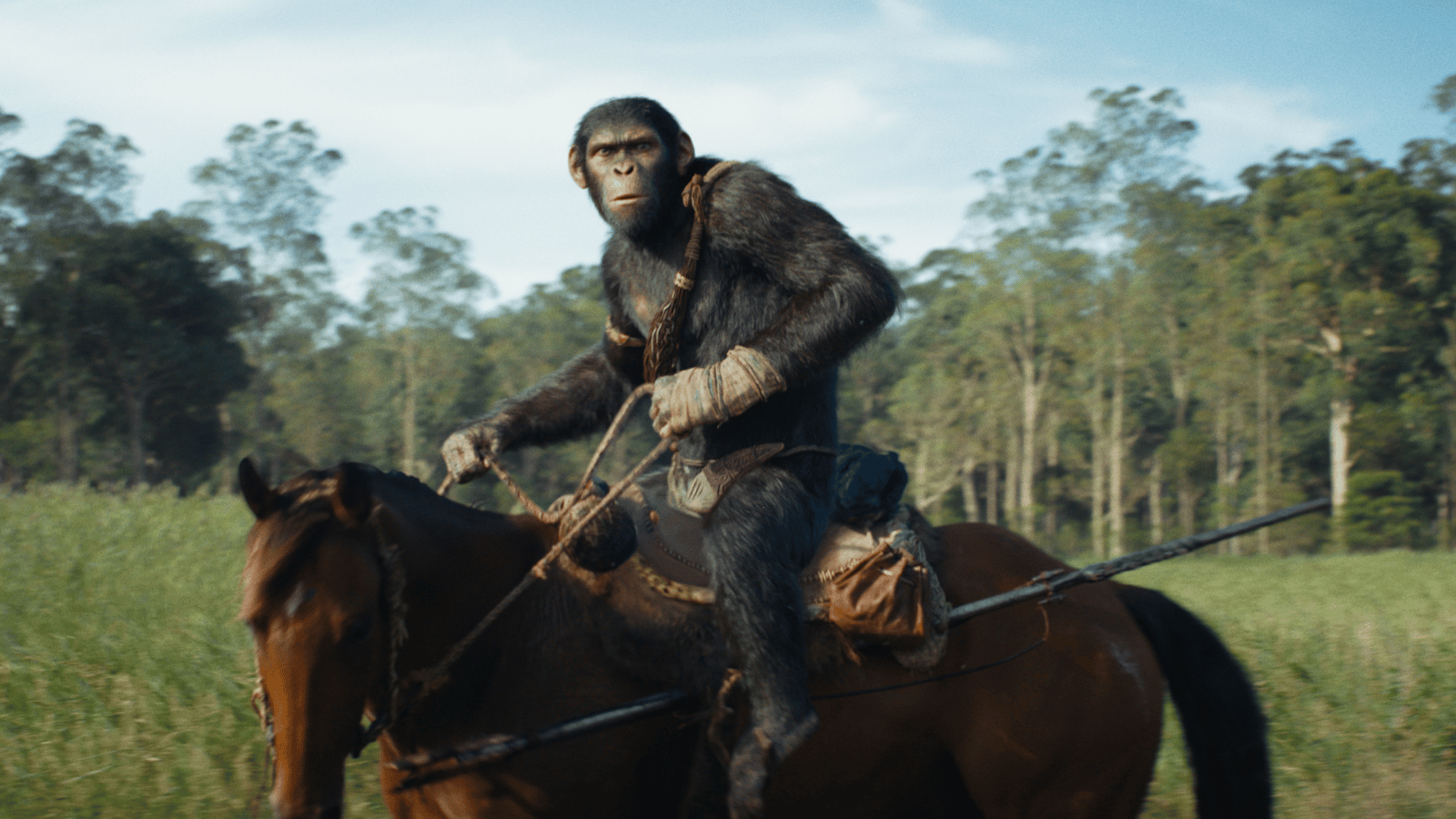“Ah, you want to make a Kurosawa movie.” That’s what screenwriter Josh Friedman said to director Wes Ball after the latter pitched his vision for the latest instalment in the Planet of the Apes franchise, Kingdom of the Planet of the Apes.
And… we get it. The Japanese director’s films often focus on a protagonist’s suffering journey, as he encounters multiple points of view and discovers more about the world surrounding him. Kingdom of the Planet of the Ape’s Noa finds himself split between the different agendas of the characters he comes across during his journey to find himself after losing his tribe.
Kingdom of the Planet of the Apes is the first Planet of the Apes movie to touch the silver screen since War in 2017. That film saw Caesar defeat the last militarily advanced human outpost and begin an unprecedented era of peace and prosperity. Many generations later, apes find themselves at a crossroads as they find themselves on the precipice of a new technological and militaristic age.
Noa’s Arc
Kingdom of the Planet of the Apes’s protagonist is an adolescent chimp, Noa, played by Owen Teague. Noa is the son of Koro (played by South African actor Neil Sandilands), one of many Elder leaders in the Eagle Clan, a tribe of apes that centres their culture around the rearing of eagles. A rite of passage in this tribe calls you to steal an eagle egg and raise it to birth and then to raise that chick to adulthood, whereupon that eagle becomes your lifelong companion.
But when Noa spots a human (yes, they’re still around) stealing fish from the smokehouse, he attempts to stop her, and in the commotion, breaks his egg — a disaster which means another year of humiliation for Noa. He immediately journeys to steal another one, and ends up indirectly causing the downfall of his tribe. He returns home to find his fellow apes either being strung up or sold into slavery. Adding salt to injury, though many of his tribe’s eagles survive, unlike his father, they won’t respond to his calls.
Thus Noa, lost and tribeless, finds himself venturing into a world he has never known. Kingdom of the Planet of the Apes establishes a new status quo in the lore of the POTA franchise. Many generations after the death of Caesar, technology is dead, and the old world, abandoned and forgotten, is almost completely overrun by foliage.
Ape World Order
Many of the animals that escaped from the San Fransisco Zoo in Rise have become integrated into the American ecosystem. Apes have expanded and evolved into different factions with different belief systems and ways of life. They speak now, too. This is also a world of apes that have no knowledge of who Caesar really was, and have to make their own meaning of the teachings he has left behind.
Those that still remember Caesar’s pacifist ideals in detail, have been reduced to one Raka, an orangutan played wonderfully by Peter Macon. Fortunately for Noa, Raka is the first ape he comes across as an inexperienced traveller. He belongs to an order of apes that pledged their lives to uphold the teachings of Caesar, being the only literate ape in the film. That order was hunted to extinction, leaving him as the sole survivor. Raka teaches Noa about Caesar’s pacifism, and Caesar’s compassion for humans, in turn helping Noa show compassion to the feral human girl that has been following them.
Unfortunately for Raka, the only other group of apes that claim to uphold Caesar’s ideals hunts humans and enslaves other apes in the name of Caesar. Led by a charismatic bonobo who calls himself Proximus Caesar (Kevin Durand), the group isn’t so much a clan as it is a kingdom, one whose subjects are either slaves or slave runners. Adjacent to Proximus’s settlement is a government-made doomsday shelter, sealed shut by large metal alloy doors. Every day Proximus’s apes slave tirelessly rigging explosives to the doors trying and blow them open, but to no avail.
The feral girl later introduces herself as Mae. Her backstory is intentionally vague. At first, Mae seems clueless and desperate, but she slowly reveals herself to be something more. First she shows Noa and Raka that she can speak fluent English. Then she reveals herself to be highly knowledgeable about human technology and the contents of the bunker Proximus is so eager to access. Proximus recognizes this, and warns Noa against her. Thus Noa finds himself torn on three ideological fronts: embrace Raka and Caesar’s pacifism, free the enslaved apes by helping Mae access the bunker, or help Proximus access the bunker and take his kind from the Bronze Age into the Iron Age.
Kevin Durand steals every scene he’s in. His Idi Amin-inspired performance captures the dictator’s alluring charisma and that aristocratic demeanour that hides a cruel barbarism. Eka Darville’s Sylva, a silverback gorilla, is a domineering henchman who makes you truly fear for Noa and his friends’ fates whenever he’s on screen. From the heroes to villains, to apes and humans, there isn’t a bad performance in sight here. This is aided by the CGI which remains exceptional.
A War of Ideals
Proximus is fascinated by the idea of evolution. He keeps his old advisor Travathan (William H. Macy), a well-read man, confined in a room full of books, so he can be regaled by tales of humans’ scientific and militaristic achievements. He is consumed with the idea of not only meeting but surpassing humans’ level of technological advancement, and is willing to sacrifice as many ape lives as it takes to do it. It’s a very industrial capitalist modus operandi, the pursuit of relentless growth and advancement regardless of its detrimental effects on the population.
Of course, he’s not entirely wrong to be both afraid and envious of humans’ level of advancement. As it’s revealed in the film, most humans have regressed to a caveman-like state, but Mae’s ability to speak and understand technology hints at a community of humans that hasn’t quite forgotten about a world before the apes took over. This sets up the central conflict of this new trilogy, apes in a race against time to evolve from their Bronze Age state into their Iron Age, before humans rebuild.
This raises the central question of this film and trilogy at large. If human beings are just the first version of an Advanced Civilisation, what will the apes do differently? What will they improve upon? What vices will they fall victim to? And what do these differences and similarities say about us? Kingdom of the Planet of the Apes fantastically manages to reframe the philosophical questions at the heart of this franchise.
Kingdom of the Planet of the Apes verdict
Every sequel’s greatest challenge is striking a balance between delivering the same world audiences love, while also innovating with fresher ideas. Kingdom of the Planet of the Apes manages to stick the landing like a housecat. It may not be a full-course meal, but it is a surprisingly thought-provoking appetizer, and entertains your palate enough to make your belly rumble for a main course.
With its stunning visuals, compelling characters, and thought-provoking themes, Kingdom of the Apes is a must-watch for fans of the franchise and newcomers alike. It leaves you eager to see how Noa’s choices and the simmering tensions between apes and humans will play out in the sequels to come.
Kingdom of the Planet of the Apes is in theatres now.
-
8







